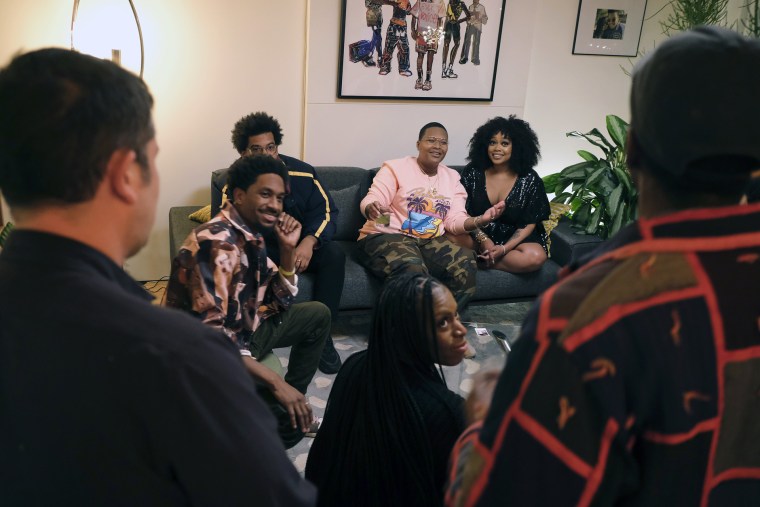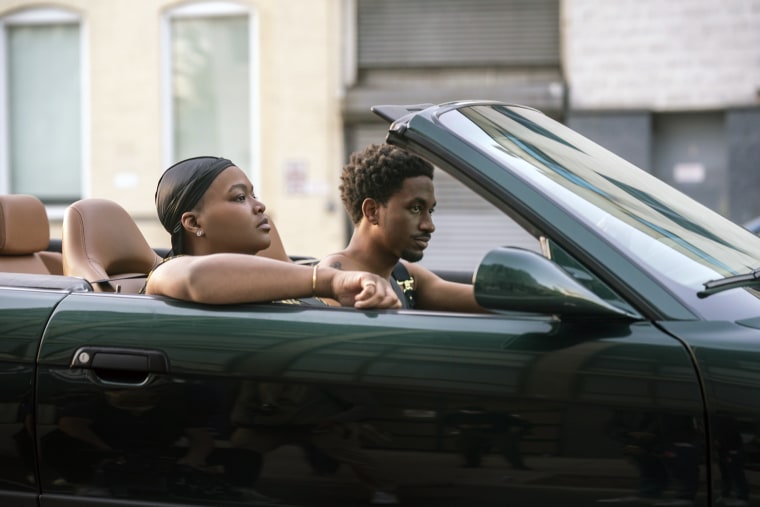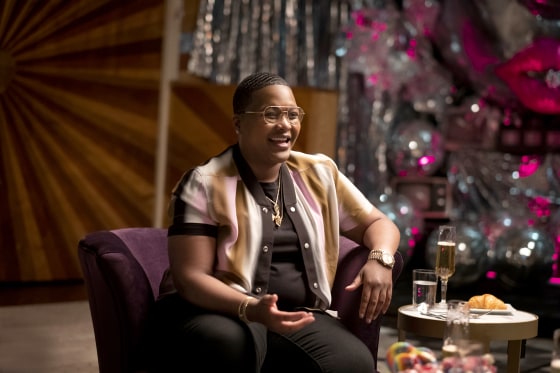The comedian Sam Jay knew how her talk show would stand out from all the others. For starters, there wouldn't be a desk.
Jay, who is also a writer on "Saturday Night Live," said she wanted to create a space not for people to think “correctly” but think honestly and critically. That's where the setting for her show, "Pause" on HBO, taking place at an informal hang comes in.
Jay invites viewers to “take a beat and listen to someone you may not listen to. Take a beat and think about something a little deeper than you normally think about it - could be a perspective you may not consider.”
Through a mixture of interviews, sketches and just talking with friends, she recreates the conversations held at kickbacks and cookouts and brings them to the small screen. Yes, Jay is Black, gay and a woman, countering what had been the dominant persona of the typical late night talk show host until fairly recently. That's why she also found it crucial to give space to others who look like her.
“I felt like I wasn't hearing the conversations that I wanted to hear and I wasn't seeing the type of discourse I wanted to see in late night,” she said. “I just wanted to see honest reactions and not canned prepared responses.”

Every aspect of the show is intentional, from the title to the structure. Instead of a boom mic looming overhead, each guest at the hangout is miked, adding intimacy to the conversations. And, she said, no one was allowed to yell cut.
Yet, the intimate approach Jay takes to "Pause" is nothing new for her. Her first comedy album, "Donna’s Daughter," interspersed her standup act with personal interviews and anecdotes. She even had tables in the venue miked to give listeners the in-person experience.
“I tried to take as much TV out of it as I could,” she said about "Pause." Instead she put much of herself into it. While the topics of each episode are different, they’re all told from a Black, queer point of view - her point of view.
She doesn’t shy away from the difficult topics and discusses her own struggles with identity, Blackness, and queerness.
“Anybody who watches that show, that knows me, is like, 'no that’s Sam!'” Jay’s willingness to lay herself bare (pun intended if you’ve seen episode three), is nothing new for the comedian. Because of her ability to be comfortable in the uncomfortable, it allows the audience to do the same.
“The overall message is for everybody, but I can only navigate. If I'm going to be honest and genuine and vulnerable, I got to navigate through my scope.”
There is a fluidity to the conversations on "Pause." Each episode has the objective to create dialogue, allowing the ability for a speaker to not have the "correct" thought.
“I chose the structure because I just wanted it to be as genuine as possible," she said. "I wanted people to be able to have honest discourse, I wanted people to feel safe.”
Jay said it was especially important to illustrate the ways Black Americans are a diverse group within themselves.

“Even if in a room full of Black people, we're not all just thinking the same,” she said. A perfect example of this is shown in the first episode when she sits down with two pro-Black conservatives.
While Jay’s own views don’t align with theirs, instead of attacking or trying to debunk their positions, she uses it as a learning moment. She consistently takes the posture of a student.
Jay’s vulnerability, natural curiosity and willingness to be wrong shape the narrative of the show. The conversations held in the show work because she invites different types of Black perspectives. With that, the audience gets to see her overcoming her own fears and misconceptions.
In episode three, she expresses her own struggles with how she represents her stud identity to the world. She interviews three stud women who have the confidence to go topless and how that's become part of their identity.
Jay wishes she had that confidence — expressing her hesitancy behind making such a move.
She centers on “the ability to grow and change and how that's limited, period. And people who don't allow people that ability.” But, the episode ends with her pushing past that self-doubt and lets it all hang out. She says that she can’t challenge everyone else in the episode if she doesn’t challenge herself.
If the show is renewed for a second season, she wants to go deeper. She sees an episode focusing on what it’s really like to be gay in the Black community. She hopes to dive into the nuances of interracial dating in the Black community and the tension it can cause.
At its core, the show is a comedy, but she said she hopes it brings a sincerity to the nuanced discussions of Black identity and vulnerability.
“For me it's not a big deal to be vulnerable because I'm a firm believer that everybody's going through this ... We're all going through it and it feels wild to all of us," she said. "So what's the point of pretending that it doesn't? What's the point of pretending like I got it all together? Because no one does.”


